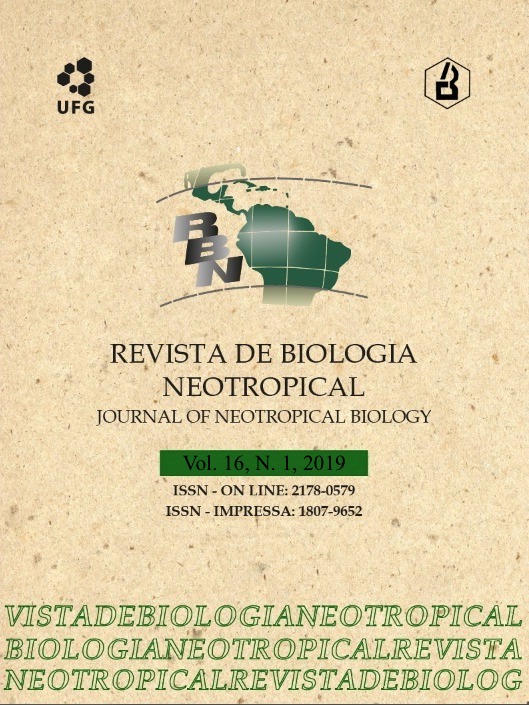The transgenic foods and the cultural reproductions of dwellers in the city of Ponta Porã – MS, border the Brazil and Paraguay
DOI:
https://doi.org/10.5216/rbn.v16i1.48642Keywords:
Social Representations, Brazil-Paraguay border, Genetically modified organismsAbstract
Agriculture has focused on technological development, research and development of new means for greater production and more profitable crops, one of them being genetically modified organisms. However, GMOs have been the subject of intense discussions in the 21st century, not only because of their short-term studies but also because of their impact on the environment and the human being. Therefore, we aim to know the social representations of the population of the city of Ponta Porã on the consumption of transgenic foods. A total of 123 interviews with a semi-structured questionnaire were conducted with passers-by on public roads nearby in the city center during the period of July and August 2015, indiscriminately. As a result, it was verified that the population showed great concern with the health and the origin of the foods, being the main the quality of these products because, they check the labels for information regarding the date of validity and nutritional information. However, there is a lack of knowledge about what transgenic and organic foods are.
Downloads
References
Alves, G. S. 2004. A biotecnologia dos transgênicos: precaução é a palavra de ordem. HOLOS. 20: 110.
Bardin, L. 1979. Análise de conteúdo. Lisboa: Edições 70. 229 p.
Castro, B. S., C. E. F. Young & G. R. Lima. 2012. A opinião pública a respeito dos organismos geneticamente modificados no Brasil: confiança e percepção de riscos. II Seminário Internacional Empírika Comunicação, Divulgação e Percepção de Ciência e Tecnologia, Campinas.
França, L. L. 2006. Transgênicos: uma questão ética. 49 f. Monografia (Escola Politécnica de Saúde Joaquim Venâncio), FioCruz, Rio de Janeiro.
Freitas, H., M. Oliveira, A. Z. Saccol & J Moscarola. 2000. O Método de Pesquisa Survey. Rev. de Adm. 35 (3): 105-112.
Grohmann, R. & R. Figaro. 2014. O conceito de classe social em estudos de recepção brasileiros. Rev. Interam. de Com. Midiát. 13 (25): 57-70.
Guerrante, R. D. S. 2003. Transgênicos: uma visão estratégia. Rio de Janeiro: Interciência.
Ho, M. W., T. Traavik, O. Olsvik, B. Tappeser, C. V. Howard, C. Von Wueizacker & G. C. Mcgavin. 1998. Gene technology and gene ecology of infectious diseases. Microb. Ecol. in Health and Dis. 10: 33-59.
IBGE Instituto Brasileiro de Geografia e Estatística. 2010. Classificação de Ocupações para Pesquisas Domiciliares COD. In: 8º Fórum Sistema Integrado de Pesquisas Domiciliares (SIPD), Rio de Janeiro. Disponível em: . Acesso em 20 mai. 2019.
IBGE Instituto Brasileiro de Geografia e Estatística. 2012. Diretoria de Pesqui sas, Coordenação de População e Indica dores Sociais. Cidades. Disponível em: <http://www.cidades.ibge.gov.br>. Acesso em 20 mai. 2015.
IBGE Instituto Brasileiro de Geografia e Estatística. 2019. Cidades. Ponta Porã MS. Disponível em: <http://www.cidades.ibge.gov.br>. Acesso em 25 mar. 2019.
James C. 2010. Global status of biotechnologies and GM crops. Presented for International Service for the Acquisiti on of AgriBiotech Applications (ISAAA). Disponível em: <http://www.isaaa.org/resources/publications/briefs/42/download/isaaabrief422010.pdf>. Acesso em 24 ago. 2015.
Leite, M. 1999. Os genes da discórdia: alimentos transgênicos no Brasil. Política Externa, v. 8, n. 2, 174-185 p., setembro. Disponível em: <http://www.agrolink.com.br/downloads/89261.pdf>. Acesso em 12 mai. 2015.
Maia, S. G. C. 2010. Aspectos do mecanismo de compensação da Reserva Legal em Unidades de Conservação no Estado de Mato Grosso: Parque Estadual Encontro das Águas, Pantanal Matogrossense. 2010. Dissertação (Mestrado em Geografia) Universidade Federal de Mato Grosso.
Neves, D. E. 2012. Análise dos impactos da produção, comercialização e consumo de transgênicos no Brasil. 39 f. Monografia (Gestão de Políticas Públicas da Escola de Artes, Ciências e Humanidades), Universidade de São Paulo USP, São Paulo. Disponível em: <http://www.each.usp.br/flamori/images/TCC_Daniel_2012.pdf>. Acesso em 17 jun. 2015.
Souza, J. V. S. 2013. Percepção dos Consumidores do Distrito Federal sobre Alimentos Transgênicos. Dissertação (Mestrado da Faculdade de Agronomia e Medicina Veterinária) Universidade de Brasília, Brasília, 111 p.
Souza, S. M. L. De & S. G. C. Maia. 2016. Representações Sociais sobre os Alimentos Transgênicos na Cidade de Amambai-MS. Cad. de Agroecol. 11(2). Disponível em: <http://revistas.abaagroecologia.org.br/index.php/cad/article/ view/20996>. Acesso em 31 mai. 2019.
Tiedje, J. M., R. K. Colwell, L. Y. Grossman, R. E. Hodson, R. E. Lenski, R. N. Mack & P. J. Regal. 1989. The Planned Introduction of Genetically Engineered Organisms: Ecological Considerations and Recommendations. Ecology. 70(2): 298-315.
Downloads
Published
How to Cite
Issue
Section
License
The expontaneos submmition of the manuscript automaticaly implies in the cession of all patrimonial rights for the Journal of Neotropical Bilogy (RBN) after publication. The autor allow the right of first publication of the article to the RBN, under Creative Commons Attribution 4.0 (CC BY-NC 4.0) Licence.
There are garanties for the authors to the authorial and moral rights, for each one of the articles published by RBN, with permissions:
1. The use of article and contents for the education and researches.
2. The use of the article and their contents, linking to the Article on the web site of the RBN, allowing the divulgation on:
- institutional closed web (intranet).
- open access repositories.
3. Preparation and divulgation of the other publication derived from the article and its content, if there is citation of the original publication by RBN.
4. Make printed copies in small quatinties for personal use.

















